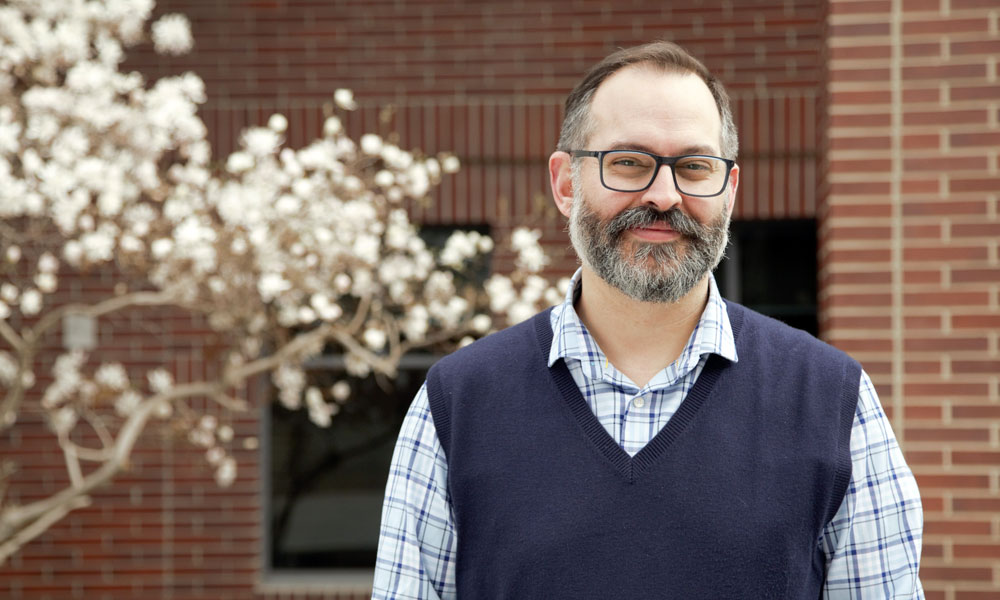Awards & Accolades, Campus Life, Faculty Profile, People, Teaching & Learning
Dr. Julien Picault navigates the unpaved path to success
April 30, 2024

About
Name
Julien Picault
Role
Professor of Teaching
Philosophy, Politics, and Economics Program Coordinator
Faculty
Irving K. Barber Faculty of Arts and Social Sciences
Program
Economics
Campus
Okanagan (Kelowna, BC)
Education
PhD, Economics, HEC Montréal
Master of Science, Economics, Université de Montréal
Hometown
L’Isle-Adam, France
“I strive to be a role model for students; I want to provide them with the tools and guidance necessary to overcome obstacles similar to those I faced.”
Many students—and even scholars—believe that economics is just about money, as conveyed by popular media. This idea is so prevalent that as a student Julien Picault also believed it—until he took his first economics course. In time, he learned to appreciate the complexity and vastness of economic reasoning.
Now a Professor of Teaching in the Irving K. Barber Faculty of Arts and Sciences, Dr. Picault views economics as a way to investigate and understand the behaviours and relationships interwoven in our everyday lives, with a critical question at its heart: how do we manage resources?
Not only is this question central to the practice of economics, but it also has far-reaching implications for our lives as we all manage scarce resources such as our time, energy and attention.
As an educator, Dr. Picault primarily devotes his resources to supporting the acquisition of knowledge among students and colleagues, guided by his own educational journey, experiences and research in economics education.
Studying did not come naturally to Dr. Picault. As a first-generation student, higher education was not something he or his family had envisioned for his future. Often enough, he barely met the minimum requirements to pass his classes. At the time, he felt many of his instructors underestimated him; some even assumed he would fail.
“I don’t have all the answers. The reality is it’s always possible to do better. By developing and sharing our resources, we stay relevant and make sure our students get something better from being here.”
Despite these challenges, Dr. Picault persisted. A pivotal moment in his educational journey was an international exchange program that took him to Montréal, which transformed his self-perception about his aptitude for education. His personal academic journey gave him a unique perspective and rare understanding of the hurdles so many students encounter.
“I learned to play with being underestimated most of the time. I didn’t feel like I found a mentor who saw value in me until I met Dr. Yves Richelle, my master’s supervisor,” says Dr. Picault. “I strive to be a role model for students; I want to provide them with the tools and guidance necessary to overcome obstacles similar to those I faced.”
As a Professor of Teaching, Dr. Picault blends research and pedagogy, using a variety of educational techniques informed by his research in economics education. His research interests originally emerged as he explored the successful engagement strategies of other economics instructors.
This project would eventually grow into The Economics Instructors Toolbox, an internationally renowned resource that supports the teaching community and impacts the education of colleagues and students around the world.
“I won’t be the one changing the world. If we progress as a society, that’s going to be our students.”
“I don’t have all the answers,” says Dr. Picault. “The reality is it’s always possible to do better. By developing and sharing our resources, we stay relevant and make sure our students get something better from being here.”
As a recipient of the 2024 Provost’s Award for Teaching Excellence and Innovation, Dr. Picault made it his mission to provide the support and mentorship he feels he lacked. He continues to reflect on students’ long-term and short-term well-being to help them overcome their educational challenges.
“I want to keep developing teaching methods, as well as new and better ways of thinking to help students reflect and navigate their way through the world. We need to expose our students to new perspectives and ideas that can broaden their horizons and encourage critical thinking,” says Dr. Picault.
“I won’t be the one changing the world. If we progress as a society, that’s going to be our students.”